As Massachusetts looks at making recreational marijuana available for adult-use, it is simultaneously legalizing a large but illicit industry while making it conducive for a startup system to flourish. As the retail cannabis industry looks to reach a billion dollars by 2020, it is inevitably attracting top talent — with a lot of diversity.
As we look to track the fledgling industry, here are nine women who are stirring the pot in Massachusetts.
Shaleen Title, commissioner, Cannabis Control Commission
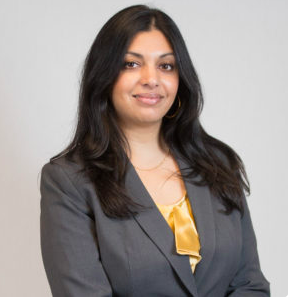
For Shaleen Title, being associated with marijuana was something the activist in her sought out. She got involved in marijuana advocacy in 2002 after she heard an ACLU speaker mention that black and latino population were 57% more likely to be incarcerated for a mandatory drug minimum. She went to Law School at the University of Illinois and that’s where she worked on her first campaign in Colorado and Massachusetts. Title was on the staff for the campaign that first legalized marijuana in the United States — Amendment 64 in Colorado was a initiative ballot measure to amend the Constitution of the State of Colorado, outlining a statewide drug policy for cannabis.
As a commissioner of the Cannabis Control Commission, she is proud of creating a modern oversight agency from scratch and developing a fully electronic licensing system. Her pet project however is the social equity program which aims to promote entrepreneurs from communities that are disproportionately impacted under marijuana prohibition. “I will be very proud if we measure the impact of our social equity program and have a model for other states to follow.”
Ellen Brown, founder, Sinsemella Seminars

After graduating high school, brown left to become a nutritionist for the US Air Force where she did one on one counseling. After that stint, Brown moved to northern California where she worked an entry level job at medical marijuana dispensary, trimming and curing cannabis. She moved back home to Massachusetts in 2012, when the state was voting for a medical marijuana program.
Local
In-depth news coverage of the Greater Boston Area.
She saw an opportunity there to combine her nutrition experience with cannabis education to hold seminars and workshops for people entering the business including veterans. Brown’s firm also works with cannabis healthcare facilities to promote awareness. “I’d like to see cannabis education at the forefront in academic research. The emerging green industry could be a paradigm shift in healthcare and unjust incarceration.”
Aja Atwood, CEO, Trella Technologies
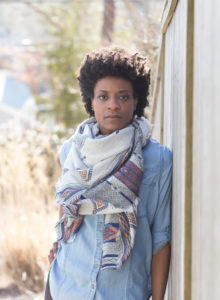
Aja Atwood, CEO of Trella Technologies, a company that makes plant-training devices for indoor growing, started off her career as an engineering consultant and specialist, working in natural catastrophe risk engineering. After struggling to grow tall cannabis plants in a small basement, Atwood conceptualized Trella, an automated plant training system for restrictive indoor spaces. Through a community outreach initiative called SXG1, the company has decided to gift their production-ready plant training system to independent growers, including state-registered medicinal cannabis caregivers and non-profit urban farmers.
“We want to be a shining example of a successful tech company based on a social responsibility model. As the cannabis industry grows, the community that supports it should grow as well.”
Beth Waterfall, founder & executive director, Elevate NE

Beth Waterfall, who used to be a marketing executive for lawyers and financial services came to work in cannabis when she first became a patient in 2015.
Waterfall says that her loss of a friend to cancer and a grandparent to dementia made her think that if we had easy access to the plant, perhaps her loved ones could have suffered less. And so she started her stint in the cannabis industry by donning two hats — as an activist and a marketing consultant. Today her firm does marketing for law and tech firms in the marijuana space. “I feel like it’s my divine purpose to connect people and to normalize this through education about cannabis.”
Emily Elmen, Head Chef, In Good Health
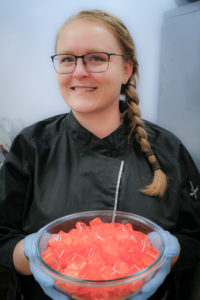
For Emily Elmen, the decision to work in cannabis came quick — right after she baked her first batch of brownies more than ten years ago. After experimenting a bunch in her own kitchen, Peck decided to explore the lay of the cannabis land when she enrolled for Cannabis Knowledge Forum, a training school started in Mass. She was also a co-host of the Boston Pot Report. She was soon elected to the board of MassCann Norml, the state affiliate of the National Organization for the Reform of Marijuana Laws, a non-profit public education organization working for the moderation of marijuana laws and raised money for legalization.
At Good Health, which is a medical marijuana dispensary in Brockton, Peck is the head chef and product developer where she develops new cannabis-infused products like salad dressing, barbecue sauce, broccoli cheddar soup, apple cider and infused sugar. “Cannabis is safer than alcohol,” she said. “I am proud to be in this field where I can expand my reach, and make these products in a safe environment.”
Marion McNabb, CEO of Cannabis Community Care and Research Network (C3RN)

Marion McNabb’s expertise in cannabis finds roots in her work in public health. Following her work in Africa and Haiti where she implemented sexual and reproductive health programs, McNabb now wants to use digital health tools for furthering academic research in cannabis. McNabb envisions C3RN as being a virtual cannabis center of excellence to promote a balanced research agenda for cannabis. “Cannabis research today is underfunded and it takes a long time for academics to conduct studies,” she said. “Our vision is to create a repository of data, best practices and aid the communication between academia and the cannabis community. In three years, the industry will look to us and see value in it.”
Laura Beohner, President & Co-Founder, The Healing Rose company
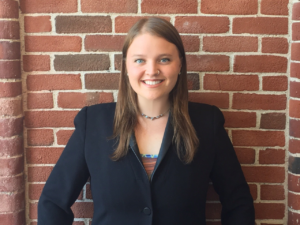
A medical marijuana patient of six years, Laura Boehner went to college with the intent of becoming a cannabis entrepreneur. Boehner became a proponent of the plant after she used a cannabis salve on her dislocated knee cap. When she finished school at Northeastern University, she started as chairperson for Womengro, that is now Elevate New England. Andover-based Healing Rose, where Laura is a co-founder and president, makes bodycare products from organic CBD oil like salve, body oils, essential oils, butter. “I want Healing Rose to become a national brand I hope that cannabis becomes a diverse industry with an open market with lots of different businesses.”
Mikki Bennett, CEO, Healing Tree Edibles

For Mikki Benett, who makes cannabis-infused granola bars and healthy snacks, the pull towards cannabis was strong. First when her 22-year-old cousin was diagnosed with brain cancer and when she herself went through a major ankle surgery. Benett refused to take opiates for painkillers and chose cannabis chocolates instead.
After being bedridden for six months and getting better without opiates, Bennett realized that she wanted to help people like her get better. “My vision is to have cannabis be an accessible medicine which can help with PTSD, anxiety and are safer alternative to opiates.”
TaShonda Vincent Lee, Cofounder & Director of Community Outreach at ELEVATE NE
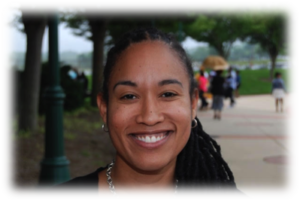
TaShonda Vincent Lee came to Ccannabis by way of being a medical marijuana patient. Lee was prescribed medications – psychotropics for PTSD and ADHD, but she was acutely aware that the medication did not improve her life and she did not like the side effects. When Lee lost her wife, she was prescribed Xanax and as she puts it, “the cocktail did not work for me at all.” When she moved to Massachusetts from North Carolina, she got enrolled in the medical marijuana program and immediately noticed a difference. Lee used to be a drug addiction counselor working with pregnant women and substance abuse. “There were a lot of folks who would express to me that they were doing alright when they were smoking weed. What I noticed that it wasn’t cannabis that did harm but the prohibition.” Lee is working on setting up a consultancy for cannabis entrepreneurs of color, training them to have skills in business development, branding, marketing and project development.
“I approach this from a restorative justice perspective — my dream is take something that’s been so harmful to my community and the legal implications, and turn it around and use it to help you — then I can say I have done my job. Want to get as many marginalized populations into cannabis as possible.”



